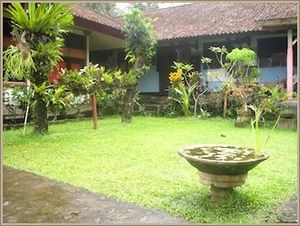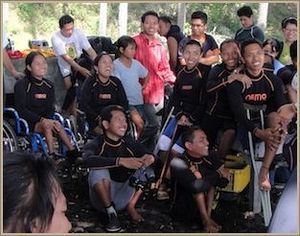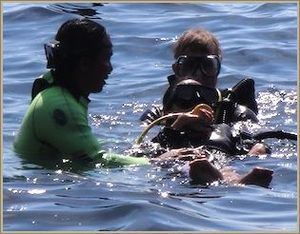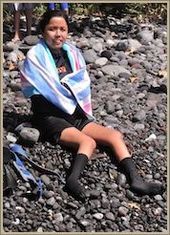Avandy Djunaidi is the owner of Bali International Dive Professionals, a scuba diving operation in Sanur, Bali. Together with the Senang Hati (Happy Heart) Foundation he is inspiring a sea change in attitudes towards the disabled in Indonesia. Story and photos by Simon Pridmore.

The Senang Hati Centre is an oasis of calm and care in a Bali that often only feels ashamed of its disabled children.
Bali, 15 December 2010. Two years ago, after completing an instructor course with the International Association of Handicapped Divers, Avandy returned home to Bali fired with a determination to use his new qualification to try to change lives in his community, to inspire others and start eroding prejudices against the disabled.
In Indonesia, it is common for families to be ashamed of their physically handicapped children and hide them away from the community. They are frequently neglected and many live in truly awful conditions. They grow up despondent and hopeless and have a very low level of self-esteem.
In his search for people who also wanted to help disabled people in Bali, Avandy came across an organisation that had already accomplished a great deal for disabled people and had ambitions to achieve a lot more. The Senang Hati (Happy Heart) Foundation is a not-for-profit organisation run by people who were severely affected by polio contracted in early childhood.

The delight on the faces of the Senang Hati divers shows just how far they have come from being virtual outcasts.
The foundation was formed in 2003 and currently occupies an old school building in Tampaksiring, deep in the hills of Central Bali. It has 200 members, 30 of whom live in the Senang Hati Centre itself. The others don’t live there permanently, but visit for activities and social events.
The primary goals of Senang Hati are to make contact with disabled people in Bali's rural heartland and lift them out of their social isolation - by giving them the means to become mobile and meet and interact with others. Avandy offered to visit the centre to talk about scuba diving, and show them some of his underwater videos. The event was a great success as the audience had never seen the undersea wonders of Indonesia.
When Avandy ended the session by telling them that they too could learn to dive and see the same things for themselves instead of on video, there was an initial silence and then a burst of laughter. They indicated he must be joking; this was impossible! How could disabled people ever do something so adventurous? None could swim; most had never been close to water except to wash.

Avandy was everywhere helping and encouraging as the divers prepared to raise the Indonesian flag underwater
Fast forward to Indonesian Independence day, August 17, 2010. National television cameras were on hand to record the sight of a dozen Senang Hati divers, accompanied by volunteers from the local diving industry, raising an Indonesian flag underwater during a dive near the Liberty shipwreck off the coast of Tulamben in north-eastern Bali.
Getting to that point was not easy; it had seen many tears, much laughter, great personal victories, minor setbacks and numerous swimming pool sessions, lectures and practice dives. But they had done it.

Diver Ayu never thought she could swim let alone go diving.
Avandy was everywhere, helping set up the site, making sure every diver entered and left the water safely, encouraging the triumphant new divers – just not in front of the cameras. Briefings, interviews and public appearances were left to others. As he said at the time: "This is just for them."
One of the divers, Ayu, with eyes shining at the memory of her day, said that somehow it still "feels like a dream." It is hard to for her to believe that she now has the skills, mental strength and, thanks to Avandy, the opportunity to go diving whenever she wants.
However, there is still a long way to go. Avandy’s next goal is to encourage others in other parts of Indonesia to follow in the fin prints of the Balinese, and to recognise that physical disability is not a badge of shame but a challenge.